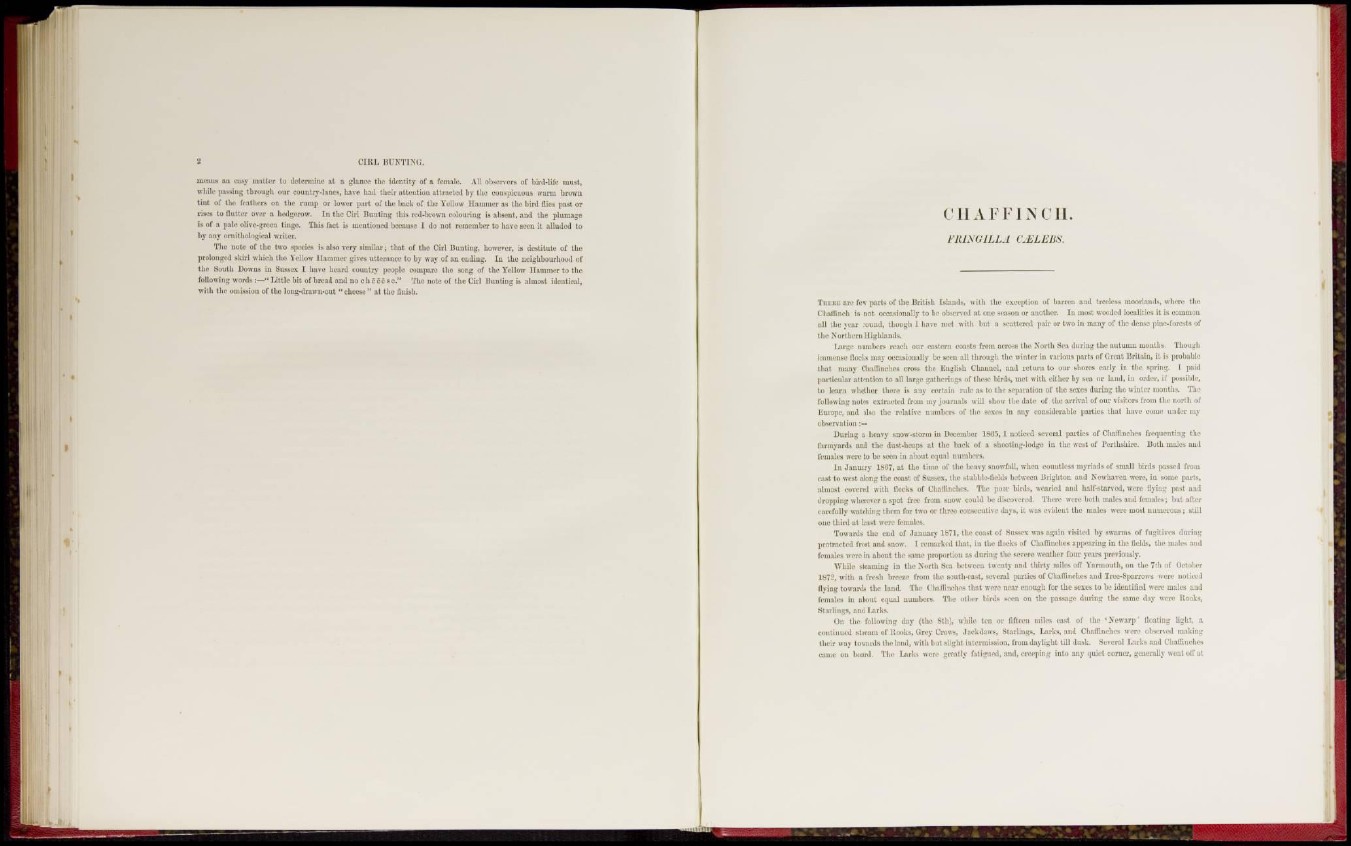
( M i l , HUNTING.
means an easy matin1 to determine at a glance the identity of a female. All observers of bird-life must,
while passing through our country-lanes, have bad their attention attracted by the eoaspieuous warm brown
tint or the feathers on the rump or lower part of the back of tbo Yellow Hammer as the bird flics past or
rises to flutter over a hedgerow. In the Cirl Hunting this red-brown colouring is absent, and the plumage
is ol a pale olive-green tinge. This fact is mentioned because I do not remember to have seen it alluded to
by any ornithological writer.
The note of the two species is also very similar; that of the Cirl Hunting, however, is destitute of the
prolonged skirl which the Yellow Hammer gives utterance to by way of an ending. In the neighbourhood of
the South Howns in Sussex 1 have beard country people compare the song of the Yellow Hammer to the
following words:—"Little bit ofhread and n o c h e e e s c . " Tho note of the Cirl Hunting is almost identical,
with the omission of the long-drawn-out "cheese" at the finish.
C H A F F I N C H .
FRINOILLA CELEISX.
Till:III: arc few parts of the Hritish Islands, with the exception of barren and treeless moorlands, where the
Chaffinch is not occasionally to be observed at one season or another. In most wooded localities it is common
nil the jcar round, though I have met with but a scattered pair or two in many of the dense pine-forests of
the Northern Highlands.
Large numbers reach our eastern coasts from across the North Sea during the autumn months. Though
immense flocks may occasionally be seen all through the winter iu various parts of Great Britain, it is probable
that many Chaffinches cross the English Channel, and return to our shores early in the spring. I paid
particular attention tr all largr gathorh
to learn vhether th ' ccrtaii
following notes extra ted fron my jour
Europe, a d also the relative numbers
observatio i;—
Durit g a heavy snow-sto m in De
at the
females w re to he se n in aho it equal
* of these birds, met with either by sea or land, iu order, if possible,
rule as to the separatioa of the sexes during the winter months. The
lis will show the date of the arrival of our visitors from the north of
of the sexes in any considerable parlies that have come under my
tuber 18(1-3, I noticed several parties or Chaffinches frequenting the
ick of a shooting-lodge in the west of Perthshire. Both males and
1 f t ITT
In January l"iC7, at tho time of the heavy snowfall, when countless myriads of small birds passed from
cast l a west along t h e coast of Sussex, the stubble-fields between Brighton and Ncwhaven were, in some parts,
almost covered with flocks of Chaffinches. The poor birds, wearied and half-starved, were flying past and
dropping wherever a spot free from snow could he discovered. Then1 were both males and females; but after
carefully watching them for two or three consecutive days, it was evident the males were most numerous; still
one third at least were females.
Towards the end of January 1871, the coast of Sussex was again visited by swarms of fugitives during
protracted frost and snow. I remarked that, iu the flocks of Chaffinches appearing in the fields, the nudes and
females were iu about the same proportion as during the severe weather four years previously.
While steaming in the North Sea lielvveeu twenty and thirty miles oil' Yarmouth, on the 7th of October
187-, with a fresh breeze from the south-ca-t, several parties of Chaffinches and Tree-Sparrows were noticed
flying towards the land. The Chaffinches that were near enough for the sexes to be identified were males and
females in alMuit equal numbers. The other birds seeu on the passage during the same day WON Hooks,
Starlings, ami Larks.
On the following day (the Sib), while ten or fifteen miles cast of the 'Newarp' floating light, a
continued stream of Hooks, tlrey Crows, Jackdaws, Starlings, Larks, and Chaffinches wen' observed making
their way ton ards I lie land, with hut slighi intermission, from day light till dusk. Several Larks and Chaffinches
came on board. The Larks were greatly fatigued, and, creeping into any quiet corner, generally went oil'at